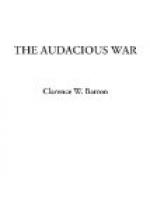I recall him from memory of bygone years, and as I saw him in Berlin when his grandfather was still on the throne—a young man of about twenty, returning from the races and dashing through the Tiergarten holding the reins of six coal-black horses.
I said to myself: “That young man will cut a dash yet.” And I still see, in higher light than before, those six coal-black horses—the horses of death.
Recently I read pages of his writings, speeches, and declarations, and there is not for the world an uplifting or new thought within them all. What appears to be new is the echo of an age that was supposed to be long past—when might was rule and valor was religion.
“There is but one will, and that is mine,” said the Kaiser, addressing his soldiers; but it has been the keynote to his diplomacy wherever it has appeared, either in pushing a commercial treaty on Russia in her hour of distress, forcing Italy into the Triple Alliance, or dictating the terms of the Austrian ultimatum to Servia, so that it would be impossible of fulfilment.
What is there of world-progress in the declaration of the present German Emperor, celebrating the two hundredth anniversary of the Kingdom of Prussia,—
“In this world nothing must be settled without the intervention of Germany and of the German Emperor.”
CHAPTER XV
THE GERMAN POSITION
An Aggressive Germany—The Logic of It—The War Party Supreme—A War for Business—What Confronts Germany—Her Finish.
A mighty nation surrounded and besieged, yet still fighting on foreign soil, is the position of Germany to-day. Her triumph would mean, not alone a European conquest, but a world-conquest. Her defeat within a reasonable time does not mean her destruction or dismemberment. It means only the destruction of Prussian militarism and that theory of national existence into which the German people have been led under the present emperor, that theory which teaches:—
“War and courage have done more great things than Charity.”
“What is good? All that increases the feeling of power; the will to power.”
“The weak and debauched must perish, and should be helped to perish.”
This is the philosophy, the teaching and the language of Nietzsche and on it Treitschke and Bernhardi founded their war propaganda.
When Emperor William II ascended the throne and became the “All Highest War Lord,” he found himself at the head of two great Germanys: a military Germany arising from the Prussian conquest of France in 1870, by which more than thirty states had been welded into a compact unity of military order, commercial tariffs, railroad transportation, and national finance; and an industrial Germany forging ahead in the commercialism of the earth at a pace exceeded by no other nation.
Bismarck and Von Moltke had made a Germany for defense. The railways did not flow to the ocean for the interchange of commerce. They ran primarily east and west to the Russian and French frontiers for military reasons; but never for attack, always for defense. It was expected that France would revive and again seek to try issues with Germany. In this she might possibly be assisted by Russia. Hence the German plans were for defense against these two countries.




